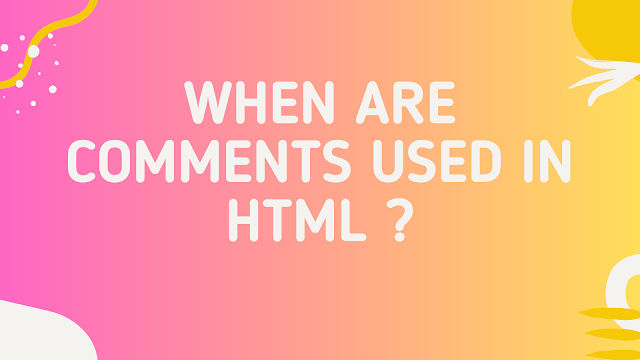In the world of web development, HTML plays a crucial role in creating the structure and content of a webpage. While HTML primarily focuses on defining elements and their attributes, it also provides a way to include comments within the code. Comments in HTML are valuable tools that offer benefits to developers during the development and maintenance phases of a website. In this blog post, we will delve into when and why comments are used in HTML and explore their significance in the web development process.
Documenting Code:
Comments are also useful for temporarily disabling sections of HTML code. By wrapping a block of code in comment tags, developers can prevent it from being rendered or executed by the browser. This feature is particularly handy when troubleshooting or testing specific parts of a webpage without having to delete the code entirely.
It provides a convenient way to isolate and analyze problematic sections. Furthermore, if you want to quickly test the effects of disabling code without setting up a local development environment, you can utilize an online HTML compiler. These tools allow you to write and run HTML code directly in your web browser, making it easy to experiment with commenting out sections and observing the changes in real-time.
Temporary Disabling of Code:
Comments are also useful for temporarily disabling sections of HTML code. By wrapping a block of code in comment tags, developers can prevent it from being rendered or executed by the browser. This feature is particularly handy when troubleshooting or testing specific parts of a webpage without having to delete the code entirely. It provides a convenient way to isolate and analyze problematic sections.
Also Read: What is the Difference Between HTML Elements and Tags?
Collaboration and Teamwork:
When multiple developers collaborate on a project, comments become essential for effective communication. They enable team members to leave messages, suggestions, or feedback within the HTML codebase. Comments can be used to discuss alternative approaches, highlight areas that need attention, or simply leave notes for others working on the same codebase. They enhance collaboration and foster a better understanding among team members.
Future Maintenance and Updates:
Websites often undergo maintenance and updates, either to fix issues or add new features. Comments become valuable references during these processes. By using comments to document the purpose and functionality of code segments, developers can easily identify areas that require modifications or improvements. Comments act as guideposts, helping developers revisit the codebase and understand its intricacies, which simplifies the maintenance and updating process.
Learning and Education:
Comments in HTML are not only beneficial for experienced developers but also for beginners and learners. Educational resources and tutorials often include HTML code samples with comments that explain each step. These comments provide valuable insights and explanations, aiding newcomers in understanding the underlying concepts and practices of HTML. By studying commented code, learners can gain knowledge and improve their HTML skills.
Conclusion:
Comments play a vital role in HTML development by providing a means to document, annotate, and communicate within the codebase. They enhance collaboration, facilitate maintenance and updates, and act as valuable learning tools. Utilizing comments effectively can make the development process more efficient, help in troubleshooting, and contribute to a better understanding of the codebase. As you continue your journey in web development, remember the importance of using comments in HTML and leverage them to create well-documented and maintainable websites.
Additionally, if you ever find yourself in need of a quick and convenient way to test your HTML code without setting up a local development environment, you can make use of online compiler for html. These html compiler online allow you to write and execute HTML code directly in your web browser, providing an efficient platform for experimentation and learning. Take advantage of these online resources to refine your HTML skills and further explore the power of comments in the context of web development.
.png)